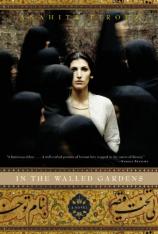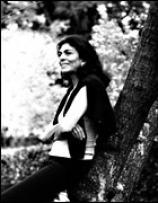Interview: September 13, 2002
September 13, 2002
Anahita Firouz, author of IN THE WALLED GARDENS, has written a powerful debut novel that is garnering attention and praise. In this interview with Bookreporter.com's Sarah Rachel Egelman, Ms. Firouz elaborates on the politics and passions that formed the turbulent backdrop for her novel.
BRC: In this novel the narration is shared between the characters of Mahatsee and Reza. Why did you choose to write in this way?
AF: Reza is a Marxist revolutionary and Mahastee is an aristocrat. Their stories are two very personal histories told through two different points of view --- a vantage point unlike what you would experience in that society or in life in general. Both characters, by baring their inner conflicts, also reveal the conflicts of an entire society trying to find its sense of identity and balance. This was particularly important to me.
There's tension here, an apocalyptic urgency as their revelations gather momentum. Reza and Mahastee's interwoven narratives, and by extension the people in their lives, show intersecting worlds at odds both politically and socially. The novel captures a month when these worlds converge only to be driven even further apart. Their narratives reveal turbulence, hairline cracks darting all over and gaining speed, until they split wide open with the seismic quakes of revolution just a few years down the road.
BRC: The Revolution looms large in this book. What idea came first --- the love story or the politics?
AF: The two main characters came first and brought everything with them. Everything was already there in them --- demanding to be told. Reza emerged first, with his politics and torn loyalties and complex layers of allegiance. Not your average revolutionary --- so single-minded as to be one-dimensional. He presented himself arriving one evening in autumn for a concert in the gardens of Bagh Ferdaus. That's where he sees Mahastee after twenty years, a woman who is very much a part of his past. Everything --- plot, passion, details, events --- comes from and spins around these two characters and their inner and outer lives. Love and politics are completely fused here. Both love and politics are mysterious in the final analysis --- how we engage and disengage from them both is fundamentally personal and visceral and emotional. By the end of the novel all the characters are trapped by what they have committed to or else omitted from their lives.
The political story here however, is about the underground groups of the Left in the mid-seventies --- who epitomized rebellion for a while --- until everything was redirected and swept away by the tidal wave of Islamic fundamentalism. I've never subscribed to a particular ideology but I'm fascinated by how politics and ideology make and unmake an individual's life, and how they propel, distort and create turbulence in a society. Turbulence is all about emotion.
BRC: Do you feel this story is particular to Iran or do these characters transcend their specific time and place?
AF: The story is all about two Iranian characters, and also about Tehran, the city. It's about an era and its particular mindsets. It's a very Iranian novel, very much so in every sense. But Bill Robinson in his review for Mostlyfiction.com, is completely right in saying that this is a novel also about any developing country and late 20th century Westernization. It's about those tottering infrastructures, political instabilities, alienation and violence; but then also about the web of traditions and close-knit families and grace of living and indefinable moments there. Ultimately, the characters in the novel, shaped as they are by a society they're trying to reshape, struggling and caught in the vortex of history, transcend time and place.
BRC: Is the world inhabited by these characters gone or fundamentally changed by the Revolution?
AF: It's gone, that world is gone. All things have changed and everyone with them. Even personal rituals, family Friday luncheons, summer weddings, the old gardens. Perhaps vestigial things remain. But the very structure and existence of that society --- and its people who are the engines driving it --- have changed forever, also in how those individuals define and see themselves. And of course Tehran has changed and grown into a giant metropolis. And the world has shifted so that unlike that era when so many students and intellectuals were Marxist revolutionaries and revolutions everywhere were imagined and made by the Left, there are now other ideologies vying for power, slicing and dicing the political landscape.
BRC: What are your feelings about the current situation in the Middle East?
AF: I have a positive outlook, though the problems of the Middle East --- democracy, religious turmoil, oil, Palestine --- are complicated and often seem insurmountable. We experience the tribulations inflicted by history in human time, whereas the time history itself requires to bend and shape and solve problems is on an altogether different scale. We despair because our life passes quickly it seems, whereas history seems to crawl along often, and its eruptions only leave a legacy of tangled problems and a human wasteland in their wake. Middle Eastern societies need to evolve organically. To implement their reforms they need to find their own solutions from the inside out, rather than getting them rushed or condensed or imported. That's their great challenge.
BRC: This is your debut work. How did you feel seeing your book in the store for the first time? What has been the early reader feedback?
AF: It was great to see my novel in the store for the first time. So satisfying! And the cover is so elegant and mysterious, it's visually arresting and distinct. I must say my early reader feedback has been terrific. I've had all ages and types and different nationalities. They say the story is gripping, that it transports them into another world; they love my style, which is particular, so I'm getting a lot of comments about that. They're moved, drawn in by this turbulent fusion of love and politics, this vanished era brought back to life. They're all in Tehran --- no matter where they're from --- living the story. A New Yorker wrote me, "My mind is in Tehran but I have to start work tomorrow! Help!"
BRC: Who are some authors who influenced you?
AF: Dostoevsky, Tolstoy, Turgenev, Flaubert, Conrad, James, Graham Greene.
BRC: What are you working on now?
AF: I've been working on a story about Iran in the 19th century. But I'm still not sure if that's the one I'll stay with. I may still switch suddenly to something contemporary.




